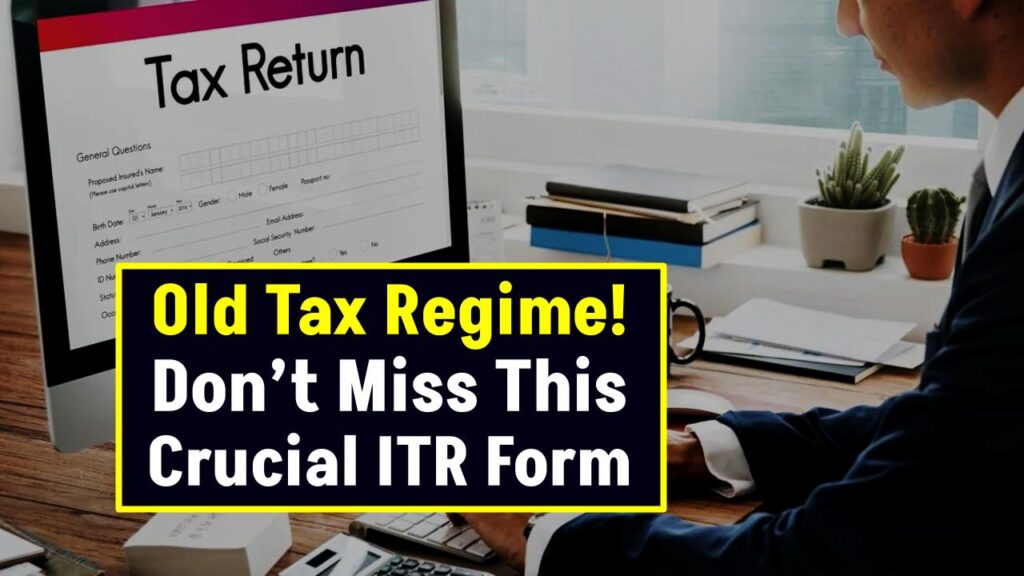Old Tax Regime: As the deadline for filing your Income Tax Return (ITR) approaches, many taxpayers are grappling with the decision of whether to opt for the Old Tax Regime or the New Tax Regime. For those who choose the Old Tax Regime for the financial year 2024–25 (Assessment Year 2025–26), it’s essential to file your ITR before July 31, 2025. If you miss this deadline, you may face significant consequences, including the automatic shift to the new tax regime and losing out on crucial deductions and exemptions.

In this comprehensive guide, we will explore the key aspects of the Old Tax Regime, the importance of the ITR filing deadline, the consequences of missing it, and a step-by-step process on how to file your ITR accurately. Whether you’re an individual taxpayer or a professional, this article will provide clear insights to help you navigate this complex area and avoid costly mistakes.
Old Tax Regime
| Key Aspect | Details |
|---|---|
| Deadline for Filing | July 31, 2025 (for opting the Old Tax Regime) |
| Taxpayer Benefits Under Old Regime | Deductions under sections 80C, 80D, HRA, LTA, and others |
| Consequences of Missing the Deadline | Higher tax liability, loss of deductions, late fees |
| Late Filing Fee | ₹5,000 for income above ₹5 lakh; ₹1,000 for income below ₹5 lakh |
| Interest on Late Filing | 1% per month under Section 234A |
| Official Resources | Income Tax Department |
Filing your Income Tax Return (ITR) on time is crucial to ensure that you don’t miss out on tax-saving benefits under the Old Tax Regime. Missing the July 31, 2025 deadline could result in higher taxes, penalties, and the inability to claim important deductions. By following the steps outlined above and filing early, you can avoid these consequences and take full advantage of the Old Tax Regime‘s benefits. If you’re unsure about which tax regime to choose or need help with filing, consider consulting a professional or using trusted e-filing platforms. Take charge of your taxes today, and avoid the stress of last-minute filings.
Why the July 31 Deadline Matters
The July 31 deadline is the cut-off for choosing between the Old and New Tax Regimes. If you file your ITR after this date, you will automatically be moved to the New Tax Regime, losing out on various deductions and exemptions available under the Old Tax Regime.
In the Old Tax Regime, you can claim several exemptions and deductions, which significantly reduce your taxable income and, ultimately, your tax liability. These include:
- Section 80C: Deductions for investments in PPF, ELSS, NSC, and other tax-saving instruments.
- Section 80D: Deductions for premiums paid on health insurance policies.
- House Rent Allowance (HRA): If you live in a rented house, this can reduce your taxable income.
- Leave Travel Allowance (LTA): You can claim this for travel within India.
- Interest on Home Loans: Deduction under Section 24(b) for interest paid on home loans.
- Standard Deduction: A flat ₹50,000 deduction from salary income.
Without these deductions, your taxable income increases, which leads to higher tax payments. For example, a taxpayer earning ₹13 lakh per year could end up paying ₹18,000 more in taxes if they miss the deadline and are forced into the New Tax Regime (source).
Consequences of Missing the Deadline
If you miss the July 31 deadline, you still have the option to file a belated ITR by December 31, 2025. However, this comes with several penalties and disadvantages:
1. Late Filing Fee
You’ll have to pay a late filing fee under Section 234F of the Income Tax Act:
- ₹5,000 if your total income is above ₹5 lakh.
- ₹1,000 if your income is ₹5 lakh or less.
2. Interest on Outstanding Tax
Under Section 234A, you will also be liable to pay interest at 1% per month on any outstanding tax that you owe. This will be calculated for every month that your return is delayed beyond the due date.
3. Loss of Deductions
Once the deadline passes, you can no longer claim deductions and exemptions available under the Old Tax Regime. This means higher taxable income and, therefore, a higher tax liability. You will also lose out on deductions like:
- 80C deductions
- 80D for health insurance premiums
- HRA
- LTA
- Interest on home loans
4. No Carry Forward of Losses
You will also lose the ability to carry forward any capital or business losses, which could be offset against future gains or income (source).
In essence, the Old Tax Regime offers a much more favorable tax position for many taxpayers, and missing the deadline could result in significantly higher taxes.
Old Tax Regime: How to File Your ITR Correctly?
Filing your ITR doesn’t have to be a daunting task. By following a few simple steps, you can ensure your return is filed on time and accurately.
Step 1: Select the Correct Tax Regime
Make sure you choose the Old Tax Regime while filing your ITR. If you select the New Tax Regime, you will not be able to claim deductions like Section 80C, HRA, and others.
Step 2: Use the Appropriate ITR Form
The form you use depends on the nature of your income. For most salaried individuals, the ITR-1 form is the correct one. However, if you have business income or other sources of income, you may need to use ITR-2 or ITR-3.
Step 3: Fill in Your Details and Declare Deductions
Provide all necessary details, such as income from salary, interest, or other sources. If you are opting for the Old Tax Regime, make sure to declare deductions under sections 80C, 80D, and others that apply to your case.
Step 4: Verify and E-file
Once you’ve filled out the form, verify your return within 30 days to complete the process. E-filing your ITR is the most efficient way to ensure timely submission, and it is mandatory for most taxpayers.
You can easily file your ITR online using the official Income Tax Department’s e-filing portal or trusted platforms like TaxBuddy or Tax2Win.
Step 5: Pay Taxes (if applicable)
If there’s any outstanding tax, ensure that you pay it before the filing deadline to avoid interest and penalties.
FAQs on Old Tax Regime
1. What happens if I miss the ITR filing deadline?
If you miss the deadline, you can still file a belated ITR by December 31, 2025. However, you will face penalties like a late filing fee and interest on outstanding taxes.
2. Can I change my tax regime after filing?
No, once you’ve filed your return and chosen the Old Tax Regime, you cannot change it unless you file a revised return. This option is available within the assessment year.
3. How do I know which tax regime is better for me?
You should compare both regimes based on your income, deductions, and exemptions. The Old Tax Regime is beneficial for taxpayers who have significant deductions, while the New Tax Regime works for those with lower deductions or higher incomes.





